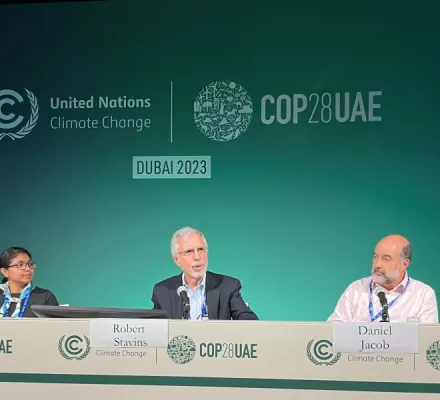
About the Harvard Project
The goal of the Harvard Project on Climate Agreements, which was established in 2007, is to identify and advance scientifically sound, economically sensible, and politically pragmatic public policy options for addressing global climate change. Drawing upon leading thinkers from around the world, the Project conducts research on policy architecture, key design elements, and institutional dimensions of international and domestic climate-change policy.
Introduction
The Twenty-First Conference of the Parties (COP-21) of the United Nations Framework Convention on Climate Change (UNFCCC), held in Paris in December 2015, adopted a major new international agreement to reduce the greenhouse-gas emissions that are changing the Earth's climate. Nearly all of the 198 national governments that are members of the UNFCCC submitted plans (Nationally Determined Contributions [NDCs]), under the Paris Agreement, to reduce greenhouse-gas emissions — a level of participation far exceeding that of the Kyoto Protocol, which was the first major international climate-change agreement. The Paris Agreement also provides a pathway for member countries to increase the ambition of their mitigation plans over time. Indeed, Parties to the Paris Agreement are scheduled to submit new and more ambitious NDCs at COP-30, to be held in Brazil in late 2025.
A great deal of work remains to be done to define how the new regime will operate and how the Agreement will be implemented, if it is to fulfill its promise. The Harvard Project on Climate Agreements is engaging leading scholars and policy practitioners to identify and assess research-based options that might prove useful as the Paris Agreement is elaborated and implemented.
Our Research
As of October 2024, the Harvard Project on Climate Agreements had released 107 Discussion Papers, three edited books (published by Cambridge University Press), and a number of policy briefs, all written by leading scholars in the fields of economics, political science, international relations, and law. These documents are available at the Project’s website. Examples of topics addressed by Project authors are:
- Options for international policy architectures and institutional venues for global climate change — including alternatives and complements to the UNFCCC (for example, separate aviation or trade agreements — and various types of climate policy clubs);
- Methods for comparing the ambition and effectiveness of heterogeneous mitigation systems that will are characteristic of the new Paris regime;
- Carbon-pricing policy, including cap-and-trade and carbon-tax systems; linkage among emissions trading systems — and among heterogeneous mitigation systems;
- Interaction between international, national, and sub-national climate policy
For research publications, news of events, presentations, and other information, see the footer of this page. You may sign up for email updates on the Project's research and events by selecting "Environment & Climate Change" on the subscribe page.
The Harvard Project has conducted research workshops in Cambridge, Massachusetts; Venice, Italy; Berlin, Germany; and Beijing and Shanghai, China — for Project authors and other scholars studying climate-change policy. The Harvard Project has collaborated with leading research institutes focusing on environmental economics and policy: Fondazione Eni Enrico Mattei, based in Venice and Milan; the Mercator Research Institute on Global Commons and Climate Change, in Berlin; the National Center for Climate Change Strategy and International Cooperation in Beijing; and Resources for the Future, in Washington, D.C.
Policy Outreach
In addition to its research workshops, the Harvard Project has conducted numerous roundtables bringing together researchers, policy makers, and stakeholders (advocates and leaders in business and non-governmental organizations), in Brussels, Washington, D.C., Canberra, Rome, London, Paris, Tokyo, Seoul, Mexico City, Beijing, Santiago, Rio de Janeiro, and Doha. Summaries of most roundtables are available on the Project's website.
The Project has conducted policy-outreach meetings at COPs 13 – 28 (2007 – 2024), with the sole exception of COP-17 (Durban, South Africa, 2011). At the COPs, Harvard Project leaders have also held meetings with individual negotiating teams from over 50 countries and with numerous leaders of NGOs and business associations. At all of these meetings, the Project receives valuable insights, suggestions, and feedback with regard to international climate-change policy.
